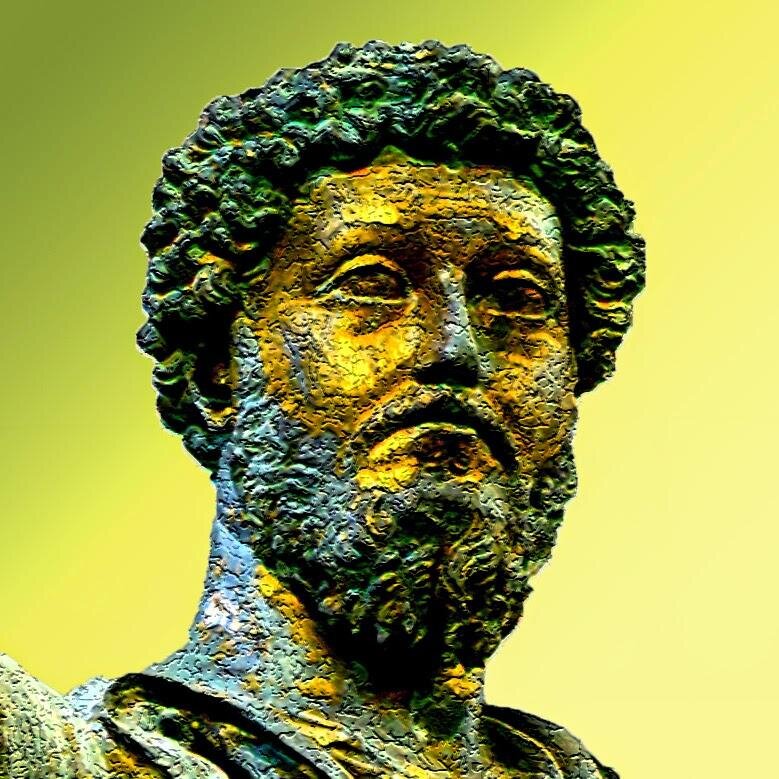Aurelius: The Timeless Legacy Of A Philosopher-King
Picture this: a man who ruled an empire so vast it stretched from the scorching sands of North Africa to the frosty hills of Scotland. His name? Aurelius. But not just any Aurelius—Marcus Aurelius, the guy who wore the crown while penning some of the most profound thoughts on life, leadership, and personal growth. Think of him as the ancient world's answer to self-help gurus, but with way more authority and fewer motivational posters. This dude didn’t just talk the talk—he walked the walk, ruling one of history’s most powerful empires while keeping his cool like a true philosopher-king.
Now, you might be wondering, "Why should I care about some old Roman dude?" Well, here's the thing: Marcus Aurelius didn’t just leave behind an empire. He left behind a legacy that still resonates today. His book, "Meditations," is like a survival guide for life’s toughest challenges, and it’s packed with wisdom that’s as relevant now as it was back in the day. Whether you’re trying to navigate office politics or figure out how to stay sane in a chaotic world, Aurelius has got your back.
So, buckle up because we’re diving deep into the life, philosophy, and lasting impact of Marcus Aurelius. By the end of this, you’ll have a newfound appreciation for the guy who managed to balance ruling an empire with writing some of the most timeless advice ever. Let’s get into it, shall we?
Read also:Alon Kemeny The Untold Story Of A Rising Star
Table of Contents
- Biography of Marcus Aurelius
- Early Life and Education
- Rise to Power
- Aurelius' Philosophy
- Meditations: The Book That Changed Lives
- Leadership Style and Achievements
- Challenges Faced During His Reign
- Legacy and Impact
- Modern Relevance of Aurelius' Teachings
- Conclusion and Call to Action
Biography of Marcus Aurelius
Before we dive into all the juicy details, let’s take a moment to get to know the man behind the name. Marcus Aurelius wasn’t just any emperor—he was a thinker, a writer, and a leader who believed in the power of reason and virtue. Here’s a quick snapshot of the man who became one of history’s most respected figures:
| Full Name | Marcus Aurelius Antoninus |
|---|---|
| Born | April 26, 121 AD, Rome |
| Died | March 17, 180 AD, Vindobona (modern-day Vienna) |
| Reign | 161–180 AD |
| Philosophy | Stoicism |
| Legacy | Author of "Meditations" and one of Rome's most admired emperors |
So, there you have it—a quick rundown of the guy who basically wrote the blueprint for staying chill while running an empire. But how did he get there? Let’s rewind the clock and explore his early years.
Early Life and Education
Growing up, Marcus Aurelius wasn’t your average kid. Born into a family of Roman nobility, he was destined for greatness from the get-go. His father, Annius Verus, was a respected senator, and his mother, Domitia Lucilla, came from a wealthy family. But here’s the kicker—Marcus wasn’t just born with a silver spoon in his mouth; he was also super smart and curious about the world.
His education was top-notch, with private tutors teaching him everything from literature to philosophy. One of his mentors, Diognetus, introduced him to Stoicism—a school of thought that would later shape his worldview. Imagine having a personal philosophy coach while still in your teens. That’s how serious Marcus was about learning.
By the time he hit his twenties, Marcus was already making waves in Roman society. He was adopted by Emperor Antoninus Pius, which pretty much sealed his fate as the next emperor. But before we get to that, let’s talk about how he rose to power.
Rise to Power
So, here’s the deal: becoming emperor wasn’t exactly a walk in the park for Marcus Aurelius. When Emperor Hadrian adopted Antoninus Pius as his heir, he made one condition—Antoninus had to adopt Marcus as his own heir. Crazy, right? But it worked out in the end because Antoninus Pius became one of Rome’s most stable and peaceful emperors, setting the stage for Marcus to take over.
Read also:Alfonso The Rising Star Whorsquos Taking The World By Storm
When Antoninus Pius died in 161 AD, Marcus Aurelius became co-emperor with Lucius Verus. Now, here’s where things get interesting. Most people would’ve been all about the power struggle, but Marcus? Nah, he shared the throne with Lucius like a true team player. This period of co-rule lasted until Lucius’ death in 169 AD, after which Marcus ruled alone.
But ruling an empire is no small feat, especially when you’ve got barbarians at the gates and plagues spreading like wildfire. So, how did Marcus manage to keep his cool while dealing with all this chaos? That’s where his philosophy comes in.
Aurelius' Philosophy
Okay, let’s talk about the real meat of this guy’s life—his philosophy. Marcus Aurelius was a Stoic through and through. Stoicism is all about accepting things you can’t control, focusing on what you can, and living a life of virtue. Sounds simple, right? Well, it’s easier said than done, especially when you’re running an empire.
For Marcus, Stoicism wasn’t just some abstract idea—it was a way of life. He believed that every challenge was an opportunity to grow and that suffering was a natural part of existence. In "Meditations," he wrote about how we should meet difficulties with grace and resilience. It’s like he was saying, "Life’s gonna throw you curveballs, but you’ve got this."
And here’s the kicker—Marcus didn’t just talk about Stoicism; he lived it. Whether it was dealing with rebellions, plagues, or personal losses, he approached everything with calmness and clarity. It’s no wonder his philosophy still resonates with people today.
Meditations: The Book That Changed Lives
If you’ve ever wondered why Marcus Aurelius is still relevant today, look no further than "Meditations." This isn’t just some dusty old book—it’s a collection of personal reflections that offer timeless wisdom. Think of it as the ancient world’s version of a self-help book, but way more profound.
Here are a few gems from "Meditations" that still hold up today:
- “You have power over your mind—not outside events. Realize this, and you will find strength.”
- “The best revenge is to be unlike him who performed the injury.”
- “Waste no more time arguing about what a good man should be. Be one.”
These words might’ve been written over 1,800 years ago, but they’re just as relevant today as they were back then. Whether you’re dealing with workplace drama or trying to stay positive in tough times, "Meditations" has something for everyone.
Leadership Style and Achievements
Now, let’s talk about how Marcus Aurelius ruled. You might think that being a philosopher-king means sitting around all day pondering deep thoughts, but Marcus was anything but passive. He was a hands-on leader who didn’t shy away from tough decisions.
One of his biggest achievements was his military campaigns. The Marcomannic Wars, fought against various Germanic tribes, were some of the most grueling conflicts in Roman history. But Marcus didn’t just sit back and let his generals handle everything—he was right there on the front lines, leading by example. Can you imagine an emperor today doing that? Probably not.
But it wasn’t all about war. Marcus also focused on improving the lives of his citizens. He reformed the legal system, expanded citizenship rights, and worked to alleviate poverty. In short, he was the kind of leader who cared about more than just power—he cared about people.
Challenges Faced During His Reign
Of course, ruling an empire wasn’t all sunshine and roses. Marcus faced some serious challenges during his reign, from natural disasters to political unrest. One of the biggest issues was the Antonine Plague, which wiped out millions of people across the empire. Can you imagine trying to run a country while dealing with a pandemic? Yeah, not easy.
There were also constant threats from outside the empire. The Marcomannic Wars, for example, were a constant drain on resources and manpower. But through it all, Marcus managed to keep his cool and make decisions that prioritized the welfare of his people. It’s a testament to his strength of character and leadership skills.
Legacy and Impact
So, what’s the lasting impact of Marcus Aurelius? Well, for starters, he’s one of the few Roman emperors who’s remembered more for his philosophy than his military conquests. His book, "Meditations," has inspired countless leaders, thinkers, and ordinary folks over the centuries.
But his legacy goes beyond just words. Marcus set a standard for leadership that’s still relevant today. He showed that being a leader isn’t just about wielding power—it’s about serving others, staying true to your principles, and leading by example. In a world that’s often chaotic and uncertain, his wisdom offers a beacon of hope and guidance.
Modern Relevance of Aurelius' Teachings
Now, let’s bring this back to the present. Why should you care about Marcus Aurelius in 2023? Well, his teachings are more relevant than ever. In a world where stress, anxiety, and uncertainty are the norm, Stoicism offers a way to navigate life’s challenges with grace and resilience.
Think about it: whether you’re dealing with a toxic work environment, personal struggles, or global crises, Marcus’ advice can help you stay grounded. He reminds us that we can’t control everything, but we can control how we respond. And in a world that’s often out of our control, that’s a pretty powerful message.
Conclusion and Call to Action
So, there you have it—the life, philosophy, and legacy of Marcus Aurelius. From his early years as a curious young noble to his reign as one of Rome’s greatest emperors, Marcus left an indelible mark on history. His teachings, captured in "Meditations," continue to inspire and guide people today.
But here’s the thing: reading about Marcus is one thing—applying his teachings is another. So, here’s what I want you to do: pick one idea from "Meditations" and try to live it out in your daily life. Whether it’s practicing gratitude, focusing on what you can control, or staying calm in the face of adversity, take one step toward becoming the best version of yourself.
And while you’re at it, why not share this article with a friend? Or leave a comment below and let me know what you think. After all, the more people who discover the wisdom of Marcus Aurelius, the better off we’ll all be. So, go ahead—spread the word and make the world a little brighter, one Stoic lesson at a time. Cheers!


